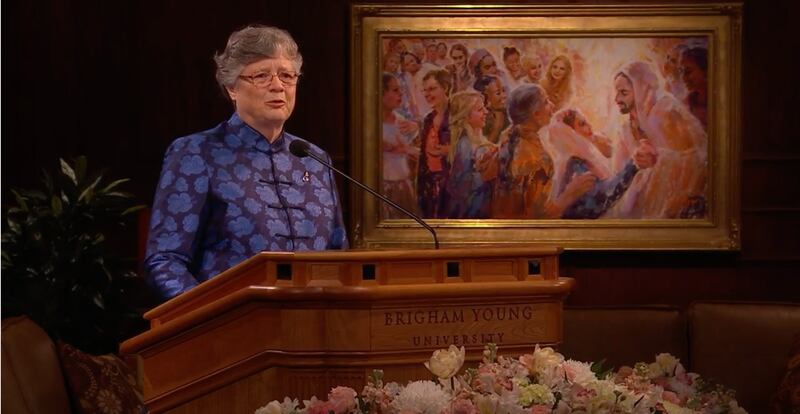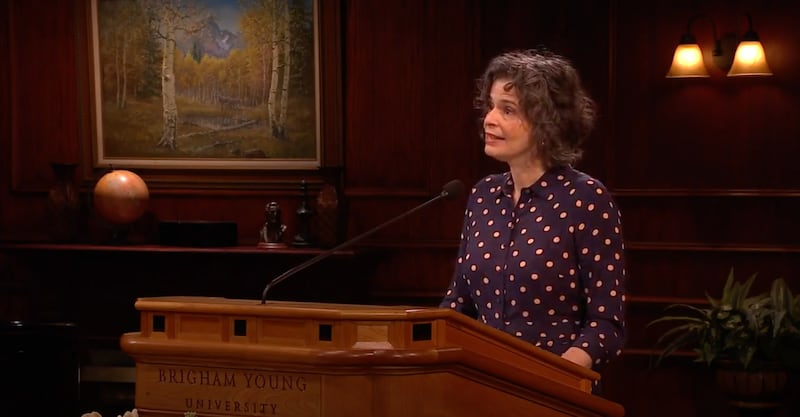PROVO — Unable to gather physically for the first time in the 45-year history of BYU Women’s Conference, women worldwide gathered virtually Friday morning to watch a digital version of the conference and focus on gathering together in Christ.
The pandemic’s impact on women was addressed immediately and repeatedly.
“We wish we could meet with you in person at the Marriott Center on the Brigham Young University campus,” said Tracy Browning, of The Church of Jesus Christ of Latter-day Saints’ Relief Society general board, “but instead, we’re sending you virtual hugs and lots of love.”
The conference’s opening speaker, Sandra Rogers, BYU international vice president and chairwoman of the 2020 women’s conference, acknowledged the difficulties of the required separation caused by the pandemic.

“These uncertain times have taxed our souls,” she said. “We are separated from others, unable to show the same close affection and care to grandchildren, elderly parents, the ill, friends or neighbors. We face economic difficulties. Our social sacrifices mean that we have experienced losses, we can’t mourn in traditional ways and burdens and milestones we can’t celebrate as we would like. We have taken on even more responsibilities, which have stretched us to the extremes of our elasticity but not to the end of our faith.
“I believe the Lord sees our cares and will give us strength as we climb this 2020 version of a pioneer rocky ridge.”
Rogers called the event a digital, mini-BYU Women’s Conference. The first hour of the event was broadcast live at 10 a.m. from a BYU Broadcasting studio in Provo. The second hour was a prerecorded Sister to Sister conversation with three women leaders of The Church of Jesus Christ of Latter-day Saints.
Then at noon, organizers released four free, video-on-demand Women’s Conference sessions on YouTube, with speakers including Sister Jean B. Bingham and Sister Sharon Eubank, of the Relief Society general presidency. The Relief Society has co-sponsored the conference since 1990.
More than 21,500 people watched on two YouTube channels alone, even though those channels were not among those advertised. That indicated a virtual audience far larger than the normal physical gathering at BYU each spring. In 2015, for example, 15,885 women attended Women’s Conference.
Women weren’t the only ones watching.
“My husband and I loved it!” Erin Stout wrote on the conference’s Facebook page. “The music was beautiful.”
Another viewer, Jane Furey, wrote on Facebook that the Sister to Sister conversation was inspiring yet real.
“Very real,” she added. “From the opening comments of the fun challenges of isolation to the hard realities of dealing with suicide, the overwhelmingness of young motherhood and so much more. I’ll be sharing and heading for the archives.”
Looking beyond the pandemic
In her talk, Rogers said blessings are available to women during the pandemic because, as Paul promised in the Bible, “all things work together for the good of them that love of the Lord.”
She suggested women could help their homes become a holier place by praying more frequently and deliberately, preparing to renew covenants and making adjustments to habits to what is eternally important.
“Are we turning to God more, because the things that were displacing him in our lives have lost their allure?” she added. “Are we looking forward with great anticipation to gathering with each other again? Have we committed to enjoy temple blessings more when the temples are open?”
A typical Women’s Conference includes more than 180 speakers presenting in auditoriums and classrooms across the BYU campus, with large general sessions held in the Marriott Center.
Rogers announced a change in the leadership of the BYU Women’s Conference. Rogers said she will retire this summer as chairwoman. She will be succeeded by Rosemary Thackeray, assistant to the president for planning and assessment at BYU.
Kate Holbrook, a managing historian in the Church History Department, followed Rogers. She spoke about what women can learn about revelation from the First Vision and the examples of women in church history.
Struggles in revelation
“For many women in the world, for example, interaction with God has felt out of reach, because it was associated most often with men and priestly office,” she said. “But the First Vision and the restored gospel provide a balance to that. Joseph Smith was in his early teens when he prayed, and he wasn’t ordained to any priesthood. Instead, he was a person who learned from the scriptures and had enough faith to pray and ask for answers. We do that, too. Although we aren’t called by God to restore the fullness of the gospel, God does call us and teach us to be more effective, wise and loving, more like our parents in heaven.”
She shared two stories from church history to show that revelation is a process, a combination of inspiration, study and faith that she said is essential to the ongoing restoration of the church.
She described how Aurelia Rogers suffered from a dark sadness and struggled with feeling unworthy when her inspiration to create activities for children became a mandate to create the church’s Primary organization in 1878.
“In real life, acting on revelation is not a promise that we will feel inspired all the time,” Holbrook said. “We did not come to earth for easy. Being embodied is not easy and working with other people is not easy, but these are two of the major reasons we are here, to have the experience of inhabiting a mortal body, and to work with and serve other people.”
She also described the revelation that immediately came to Sister Ardeth G. Kapp to create a charter statement and set of values when she was called as the church’s Young Women general president in the 1980s.
The values and Personal Progress program would become the centerpiece of the Young Women program for decades, but Sister Kapp labored for five years to complete the project because of frustrating delays, communication gaps and difficult collaborations.
“By virtue of our membership in Relief Society, we are called to instruct inspire and heal,” Holbrook said. “How could God not want to communicate with us when God needs us to do this work? Not all of us have the skills to easily understand revelation, but I believe even those of us who struggle with personal revelation can grow close closer to God in the process of doing good work.”
Sister to Sister conversation
The Sister to Sister conversation covered a wide range of topics. The panel included Sister Reyna I. Aburto, second counselor in the Relief Society general presidency; Sister Becky Craven, second counselor in the Young Women general presidency; and Sister Lisa L. Harkness, first counselor in the Primary general presidency.
They responded to questions about dealing with the pandemic; facing depression and anxiety; their experiences as young mothers and how they managed burn out and caring for themselves; handling comparison and judgment; the struggle of difficult family relationships; building spiritual and emotional resilience to prepare for unexpected personal difficulties; what it means that women have been endowed with God’s priesthood power; and feeling discouraged by church callings.
“When we compare ourselves with others, we focus on what they have and then we desire their blessings, their talents and their experiences,” Sister Harkness said. “When we do this, we’re taking our eyes off the Savior and instead, looking sideways to the mortals in our lives. Sisters, I think if we’re not very careful here, we might completely overlook our divine, unique gifts.”
Sister Craven noted that more than 30,000 missionaries returned home over the past six weeks because of the pandemic, some dealing with the premature end their missions and others with reassignment.
“I know that this has been difficult for many missionaries and their families,” she said, adding, “Those missionaries should not put an asterisk by the side of their mission. We hope that they can each declare confidently when and where they served without adding any type of a qualifier. ... The Lord will accept their offering.”
Sister Aburto taught about the meaning of Relief Society.
“Relief Society is not a room in a building, it’s not an hour every two weeks when we get together. It’s not an activity. It is the women of the church,” she said. “It is us, each of us, all of us. And we can be armed with righteousness and with the power of God to prepare the earth for the Second Coming, to save souls, to defend our soul and our homes from spiritual dangers, to declare ‘glad tidings of great joy unto this generation,’ to perpetuate righteousness in an organized way, collectively and also individually.”
Additional on-demand videos available
Usually, only a handful of Women’s Conference sessions are shared online. The media library on the church’s website, ChurchofJesusChrist.org, hosts a total of 14 videos of events at BYU Women’s Conferences from the previous four years, 2016-19.
The four free, video-on-demand sessions for 2020 released on YouTube at noon on Friday included:
- Sister Jean B. Bingham, Relief Society general president, and Sister Sharon Eubank, first counselor in the Relief Society general presidency, speaking on “Gathering in the Latter Days.”
- Rosemary Thackeray, assistant to the president for planning and assessment at Brigham Young University, spoke about “The Lord Knows You and Is Aware of You.” Thackeray previously worked for the Centers for Disease Control and as a professor in BYU’s department of public health.
- Gaylamarie Rosenberg, an adjunct faculty member at BYU in the department of Church History and Doctrine and former member of the Women’s Conference Committee, who spoke on “Gather To Be Perfected but not Perfect.”
- Maria Luisa Torres and David J. Torres spoke about “Taking Time to Talk: Communication in Marriage.” Married 44 years, the couple has five children and 16 grandchildren. She is a former member of the the Relief Society general board and he was the president of the Guatemala City North Mission.


